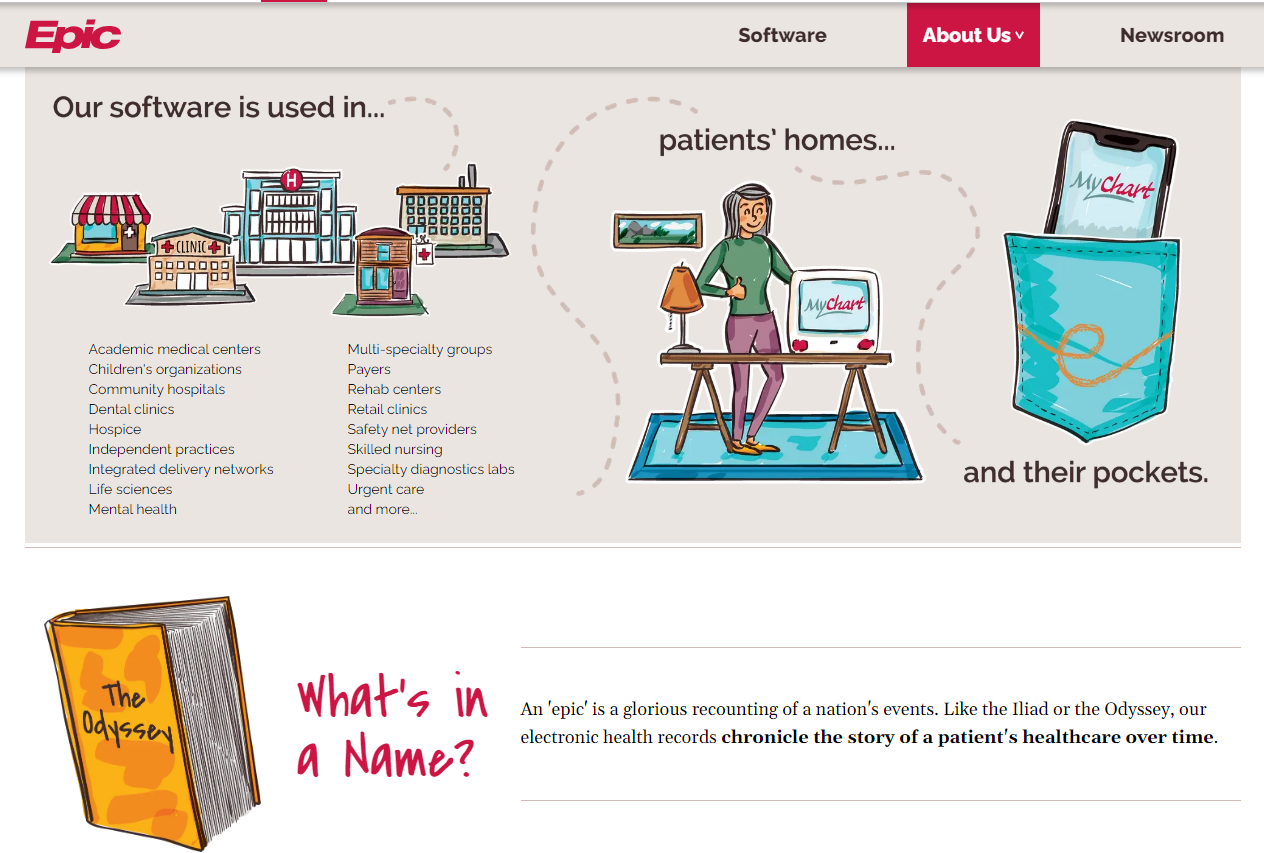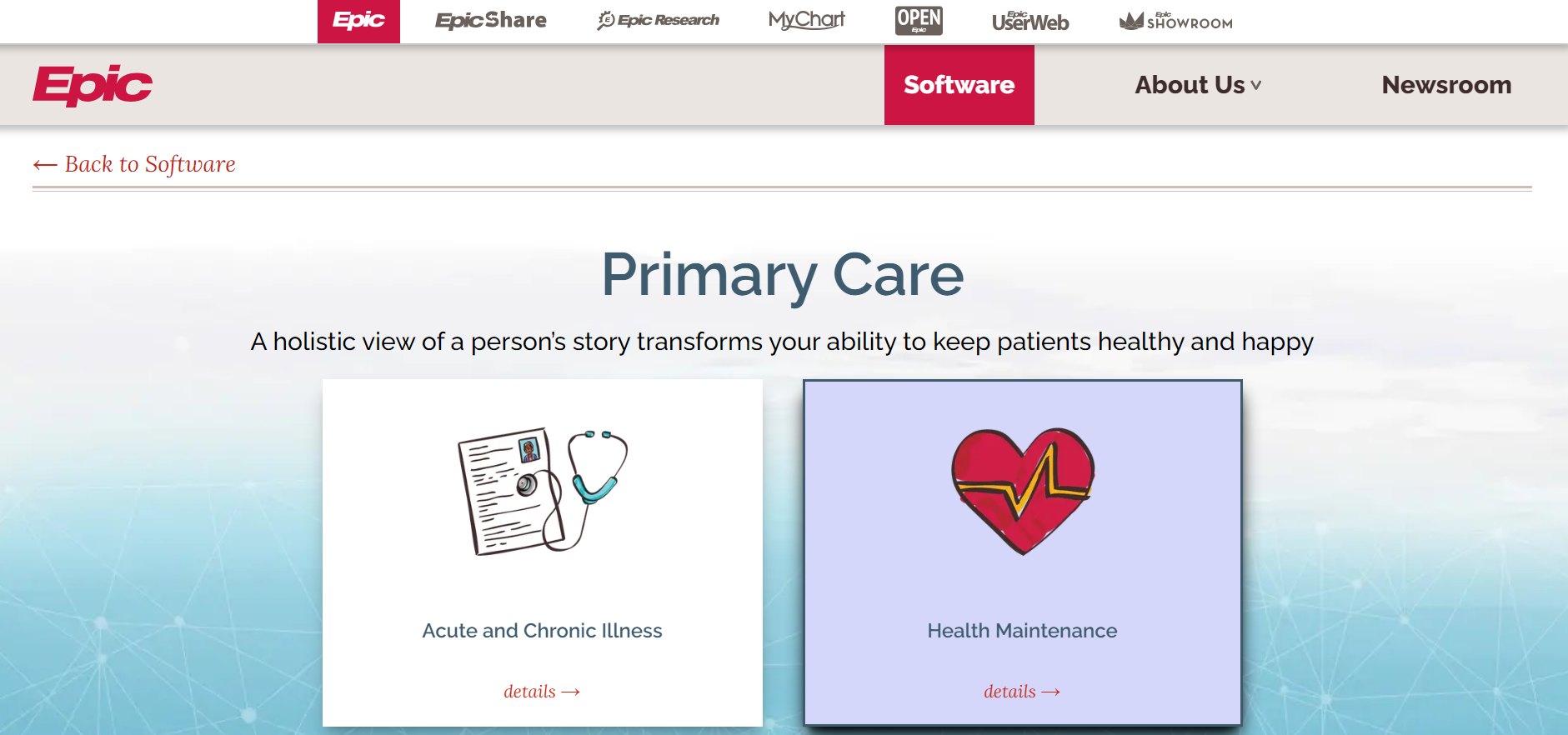Epic is a leading EHR system offering diverse features for efficiently handling electronic patient records. Trusted by multiple organizations, including medical centers, specialty diagnostic labs, and dental clinics, this software has changed how healthcare providers manage their day-to-day tasks.
With a patient-focused mission and a nearly 40% overall EHR market share, Epic EHR continues to partner with different hospitals to deliver high-quality care.
Here’s a deep dive into the Epic EHR system.
Table of Contents

Epic EHR Overview
Epic EHR is a cloud-based electronic health record (EHR) system that can handle the daily operations of a healthcare practice. It’s different from an EMR (electronic medical records), which is only responsible for medical records.
It’s a platform that can help you create patient health plans and empower them with self-service tools. You can also monitor the patient’s care journey and work with other systems for better care coordination. It can also store patient medical records, such as patient history, referrals, medical templates, and additional useful information to help medical practitioners provide the highest level of care.
With its reporting and analytics functionality, you can gain insights and develop timely decisions based on the data gathered by the system.
Epic EHR Software Features
The following are the major features of EpicHealth EHR:
- Patient History
- Medical Templates
- Referrals
- Scheduling
- e-Prescription
- Appointment Management
- Clinical Workflow
- Insurance and Claims
- Billing Management
- Document Management
- Patient Demographics
- Patient Portal
- Lab Integration
- Voice Recognition
- Reporting and Analytics

How Does The Epic EHR Work
Epic EHR provides a comprehensive health information system designed to digitize and manage various aspects of patient care.
Here’s how it works:
- Patient registration: Patients enter their information into the system, creating a digital record. This can include basic demographic details, contact information, insurance information, and more.
- Appointment scheduling: Epic helps schedule appointments with available healthcare providers, making it easier to manage the flow of patients through the healthcare facility.
- Clinical documentation: Healthcare providers use Epic EHR to document patient encounters, including medical history, symptoms, diagnoses, treatments, and medications. The documentation can be done in real time during the patient visit or later through a review of the encounter.
- Order entry and diagnostic test results: Physicians can use Epic EHR to electronically order tests, medications, and other treatments. It can facilitate reporting and tracking of test results, so it’s easier to monitor patient progress.
- Medication management: Epic EHR includes e-prescriptions, which help track medication administration and reduce errors from inaccurate manual data entries.
- Revenue cycle management: Epic EHR has features for managing billing and revenue cycles so that healthcare organizations can streamline the financial aspects of patient care.
- Patient Portal: Patients can access their health records, view test results, schedule appointments, and communicate with healthcare providers from a convenient, personalized dashboard.
Epic EHR offers a unified digital platform that enhances the efficiency and effectiveness of healthcare delivery while improving patient outcomes and safety.
Epic EHR Pricing
Epic’s cost depends on the size and needs of your healthcare organization. While its website encourages those interested to request a quote, several review sites peg the costs between $1,200 and $500,000.
For small practices with limited medical records, Epic provides more affordable plans but with limited functionalities. They only include the features that a small practice will benefit from. Furthermore, the setup and integrations are also simple, lowering the overall costs.
Meanwhile, larger practices like hospitals that need an entire suite of options are charged higher. These practices are also complex and will require a specialized setup. They will have administrative features and multiple integrations that require Epic to provide a more extensive EHR solution. To make their solution affordable, Epic allows you to customize the features you need and scale from there.
Epic also charges training costs to guide your team in using the software. Most organizations find this essential since the system tends to be complicated, especially for first-time users. They also have a separate migration, maintenance, and implementation fee should you need their team’s assistance.

Use Cases for Epic EHR System
Epic provides multiple use cases for its comprehensive system. One of its featured uses is population health management, where you can share and aggregate data across your network to close care gaps and eliminate duplicate testing. This helps you get the patients to the right doors and determine improvement opportunities across the patients in your population. You can also guide your team to efficiently identify and address clinical care gaps, all while using integrated health and social care tools to promote patient wellness.
Epic EHR system also advances the medical community by enabling research into various health concerns. It has a genomics module that can help clinicians use genetic results to diagnose rare diseases and treat cancer. With access to data from the Epic community, clinicians can also provide precise medicine and insights into various points of care. This empowers them to create individualized treatments and accelerate healthcare innovation.
Lastly, Epic is instrumental in continuing care, where patient treatments can be completed at home or through community care. It can be used to provide long-term care and has unique tools for rehab treatment. These are just some of the many use cases for Epic, making it a valuable solution for any healthcare organization.
Streamline Faxing With Epic Using iFax
Epic enables multiple integrations that make their system powerful yet simple to use. One of these is digital faxing capability. iFax EHR integration lets you send and receive faxes within your Epic EHR system.
You can securely exchange information with other providers by sending them a secure fax using your Epic account. You don’t need to print hard copies of medical records or manually enter patient data. All you need is an active iFax account to enable the integration.
See how iFax can seamlessly integrate with Epic. Request a free demo now.







